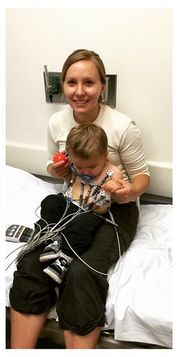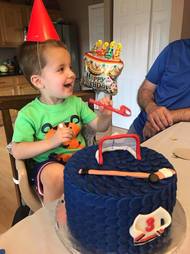 By Caitlin Winkler, PLPC Backpack, check. School supply list, check. New clothes, check. Haircut, check. It’s that time of year. Saying good-bye to summer and hello to school is getting closer, if not already here, and you’ve checked (or almost checked) all the boxes on your to-do list. Each year we do our best to prepare our child for a new school year. Something we often fail to discuss is the need to be mentally and emotionally ready as well. School brings a whole new set of trials each year. From academic challenges, teacher meetings, to tears over friendships, missing the bus, and the excitement of starting something new, this school year is bound to have its ups and downs. How can you help get ready for those tough times? Five Tips to Prepare Mentally and Emotionally for the New School Year: 1. Meet physical needs first. If you can remember Maslow’s hierarchy of needs from Psychology class, basic physical needs are the foundation upon which everything else is built. It is hard to get up for the bus, be prepared for a test, and meet obligations at school if you’re not sleeping well, not getting adequate nutrition, and do not have a secure and safe place to live. 2. Talk to your child about their thoughts and feelings. You could ask: What are you looking forward to? What are you nervous about? What are you excited to learn? Who are you looking forward to meeting? What are some concerns you have? How will this year be different than last year? Your child may surprise you with his or her answers. Validate their feelings and listen to their concerns without passing judgment or minimizing their thoughts. It is important for them to feel heard and understood. 3. Be aware of your child's struggles. Does your child have test anxiety? Is making new friends scary or really hard? Does your child struggle with having positive behaviors at school? Think about your child's strengths and weaknesses. As parents, it can be easy to only want to see the great things about our child, but the reality is, our children are not perfect. Everyone struggles with something. Helping your child prepare, work through, and persevere through a challenge or limitation is so important. Connecting your child to resources, such as tutoring, social skills groups, and counseling can make a huge difference. Be proactive in reaching out for help. 4. Give them the power. Many people pass blame and fault to others. Even as adults, we do this. But, something so vital for our children to learn is the fact, "I can control myself- my behaviors, my thoughts, my attitude, my words." They have the power to control themselves and are ultimately responsible and accountable for their actions. Once they recognize and learn this, they can tackle any challenge thrown their way. They can handle a tough teacher, an argument with a friend, a low grade on an assignment, or not making the team. As children and as adults, we choose our thoughts, whether they are positive or negative, and our actions are born from those thoughts. Positive thinking leads to positive feelings and positive behaviors. 5. Prioritize your schedule. We often expect ourselves and our children to keep up a crazy, fast-paced schedule. Many children are exhausted not just physically, but mentally and emotionally as well from the demands on our calendars. Cutting back on sports practices, extracurricular activities, and outside commitments may be necessary. Our children need time to just be kids- time without structure, time-lines, and expectations placed on them. Make time to play outside, laugh as a family, and have a night at home. This can make a huge difference in the mental and emotional well-being of your child. Caitlin Winkler is a Provisionally Licensed Professional Counselor at Unlimited Potential Counseling & Education Center in O'Fallon. Caitlin is under the clinical supervision of Emily Kircher-Morris, LPC (MO #2012026754).
1 Comment
Counseling Before Marriage? How Couples' Premarital Counseling Sets Up a Successful Marriage4/27/2017  By Caitlin Winkler, PLPC What is premarital counseling? You may ask, "If my future spouse and I are in love and ready to get married, why would we need counseling?" I believe this is a common way of thinking among individuals and couples today. Counseling is often viewed as a tool to help solve a current problem or struggle, but it is also something that can be used before an obvious issue arises. Think of it this way: if you are building a house, what is one of the most important steps? Engineers and builders would argue laying the foundation is critical. Why? Because the foundation is what everything else is built upon. Without a solid foundation, the house will be weak, it may fall, and it will not last long. The same is true with marriage. In our marriages, we often wait until we start to see the walls crumbling before we seek help. One preventative, proactive measure to take is premarital counseling. Yes, you are excited about marriage and do not fear divorce. But what happens when the storms of life start to blow and your strength is truly tested? Premarital counseling helps to strengthen your foundation. It involves thinking, planning, discussing, compromising, and preparing for a future life together, perhaps sharing about topics not even thought about before. It is designed to be a tool that helps create solid, lasting marriages. I am excited to offer premarital counseling at Unlimited Potential Counseling in the O'Fallon/Dardenne Prairie area. Our world needs strong marriages to help build strong families. This service is offered through a Christian perspective and integrates the importance of faith in the relationship. Please contact me and I will be happy to answer any questions you and your future spouse may have! Caitlin Winkler is a Provisionally Licensed Professional Counselor at Unlimited Potential Counseling & Education Center in O'Fallon. Caitlin is under the clinical supervision of Emily Kircher-Morris, LPC (MO #2012026754).  By Caitlin Winkler, PLPC When thinking about how I wanted to approach writing this blog, I really struggled with what direction to take. There is so much I wish I could share and convey in my words. I hope you find some encouragement, hope, and peace in these thoughts that come from a very personal place. International Pompe Day is recognized each year on April 15th. The day is designed to bring awareness of this rare genetic disease and hope to those impacted by it. This strange name (pronounced POM-PAY) may sound familiar. President Trump highlighted Pompe on Rare Disease Day in February during a joint address to Congress. Never before has Pompe been shared on the world stage in this way. To hear Pompe mentioned in this setting was overwhelming because of the personal relevance it brings to my family. Our son was 8 days old when we found out he failed the newborn screening for Pompe Disease. With further testing, a lot of waiting, and many tears, doctors confirmed his diagnosis on his one month birthday. At that time, we didn't know what the next year would hold: Would he survive? Would he be in the hospital all the time? Will he ever walk? How do we handle this? After further testing (again) and meetings with doctors and genetic counselors, our son is said to have a mutation which indicates a later onset of this disease, meaning he is developing and functioning as he should at this time (He just turned 3 this weekend!). However, at some point in his life, he may begin to have symptoms. This disease involves a build up of complex sugars in the body, causing muscles to breakdown and begin to lose functioning. This can lead to troubles with the heart, eating, walking, and breathing. As the disease progresses, depending on the severity and extent of symptoms, it can lead to death. We are grateful for a healthy boy, but if I let myself, I can easily worry about what tomorrow holds and if/when this disease will begin affecting my son.  As parents and adults (and kids!), it can be easy to worry about tomorrow. Whether it is a rare disease diagnosis, a financial crisis, death of a loved one, or traumatic event, life is going to throw some curve balls our way! Walking through these trials is painful, miserable, and just plain hard. So what can we do when life gets bad? Here are some things that helped me survive and tread through some of my personal storms: 1. My faith 2. Strong support system- family, friends 3. Allowing myself to grieve and cry 4. Not taking a single moment for granted - life is short 5. Finding the positive and counting my blessings 6. Taking it one moment at a time - baby steps 7. Allowing people to help and asking for help 8. Kept going - I learned I am stronger than I thought I was! 9. Sharing my story when I am able to encourage and help others I don't know what your world looks like right now. The future may be unknown and terrifying. As Christopher Robin said to his great friend Winnie the Pooh, "You are braver than you believe, and stronger than you seem, and smarter than you think."
You've got this. Learn more about Pompe Disease: https://rarediseases.org/rare-diseases/pompe-disease/ Caitlin is under the clinical supervision of Emily Kircher-Morris, LPC.  By Caitlin Winkler, PLPC What happens in a therapy room? Counselors use a variety of techniques and strategies geared to help clients reach their goals, but the overarching goal is the same: counselors want to help you get from point A to point B. Think of it this way- After years of eating unhealthily, it can be easy to gain a lot of excess weight. This happens over a long period of time, with consistently unhealthy habits, and a lack of change toward the positive. After gaining the weight, it is easy to become overwhelmed with all the weight needed to be lost. Though the desire is there to change, the action may not be. At this point, people can choose to stay where they are or change years of unhealthy habits and patterns. Some may join a gym, find a trainer, or join an accountability group. For those who train their bodies to eat healthier, exercise, and work towards their goals, change can be seen as they continue their healthy choices. This takes intentional effort, energy, and, possibly, a lot of time. In counseling, the process is the same. Counselors are like your trainer at the gym. With possibly years of unhealthy thinking patterns, choices, and behaviors, it can be extremely difficult to re-train the brain and lose that excess weight! But, just like in physical training, counseling can create a new and healthy mindset to help you overcome your anxiety, depression, and more. Counseling is not always an easy, process. Just like a killer workout at the gym, it takes work and perseverance. But, the time, effort, and energy is worth it in the end! Caitlin Winkler is a Provisionally Licensed Professional Counselor at Unlimited Potential Counseling & Education Center in O’Fallon. Caitlin is under the clinical supervision of Emily Kircher-Morris, LPC (MO #2012026754).  By Caitlin Winkler, PLPC What are your thoughts and opinions on counseling? Are you picturing someone lying on a couch and a counselor sitting behind them with a notepad asking, "And how did you feel about that?" And what do clients and counselors talk about? Just their childhood, right, and unconscious motives? There seems to be so much mystery that surrounds the counseling world. Perhaps this is due in part to the very nature of counseling - focusing on the mind, which is something we cannot physically see and we may not immediately notice the change taking place. Not knowing or understanding the process of counseling adds to the mystification (more on this in a future blog). When people do not learn how to ask for help or admit they need help, they bottle up feelings of anxiety, shame, helplessness, and can't seem to find hope. Often, people will turn to alcohol, drugs, unhealthy relationships, become workaholics, never take risks, or use other things to ignore or combat the struggle. It is okay to ask for help and admit we are not perfect. This is where counseling comes in. Somewhere along the way a stigma has been attached. People fear coming to counseling, struggle to say they need help, or are even embarrassed. It can also cause you to question yourself. I have worked with many kids who really struggle with this. They may think, "My friends are not in counseling, so what is wrong with me?" I try to remind them people have different struggles and need different tools to help them be successful. Counseling is not a permanent, life-long commitment. In many cases, therapy is necessary just for a season in someone's life. I have noticed that everyone, at some point or another, could use the objective, extra support that counseling provides. You can start combating the counseling stigma now and change your life. And besides, who decided admitting you don't have it all together is such a negative thing? If you are human, you don't have it all together. When you own your weakness, your struggle, and your past because it is what makes you who you are. Use it to build a better future! Caitlin Winkler is a Provisionally Licensed Professional Counselor at Unlimited Potential Counseling & Education Center in O’Fallon. Caitlin is under the clinical supervision of Emily Kircher-Morris, LPC (MO #2012026754).  By Caitlin Winkler, PLPC The excitement of a new baby compares to almost nothing else in this world. Parents dream of the baby growing inside: what he or she might look like, the type of personality the little one may have, and all the wonderful experiences to come with the bundle of joy. What happens when what we picture as the perfect, most wonderful time of our lives turns out not to live up to our expectations? Pregnancy and postpartum mental health issues are more common than you might think. Anxiety, depression, a heavy sense of being overwhelmed, and even grief are normal after the birth of a child. There are times, however, when these feelings are more than just passing emotions. About 15% of women experience some sort of clinical mental health issue during this stage of life. These conditions can begin during pregnancy, immediately after giving birth, or within the first few months after the arrival of your new baby. They may last a few weeks or even up to a year. 5 signs you may be dealing with postpartum anxiety or depression:
Many parents can write off the intense emotions as "just adjusting" or "completely normal." Though this can be true, don't be afraid to ask your doctor or counselor questions. A new baby is a wonderful thing, but the physical, emotional, and mental demands can be extremely taxing. Seek out help! This is best for you, your partner, and your child! Self-assessment tool (Edinburgh Postnatal Depression Scale): https://psychology-tools.com/epds/ Learn more from the American Psychological Association: http://www.apa.org/pi/women/resources/reports/postpartum-depression.aspx-- Caitlin Winkler is a Provisionally Licensed Professional Counselor at Unlimited Potential Counseling & Education Center in O’Fallon. Caitlin is under the clinical supervision of Emily Kircher-Morris, LPC (MO #2012026754). By Caitlin Winkler, PLPC Becoming a more positive parent does not mean always looking on the bright side and sugar-coating life with your child. It doesn't have to be silly, corny, or uncomfortable. It also does not mean never telling your child "no." Again, there is a time and place for using these words and phrases. This style focuses your attention on the positive actions, behaviors, and thoughts your child exhibits more than the negative. It involves making positively-worded statements toward your child significantly more often than negatively worded statements. Using these toward your child encourages them to continue a wanted behavior and still maintains your authority. To break it down, positive parenting involves using positive praises and positive directives. Positive praises are used at any time. They are meant to reinforce wanted behaviors and words. Positive directives (or called positive opposites) teach your child what actions you are wanting them to have. Continuing the list from the previous post, here are six more ideas of how you can be a more positive parent to your son or daughter. 6. Be aware of positive opposites. Positive opposites teach your child what TO DO instead of limiting the message about what not to do. Instead of saying "Don't hit or kick other kids" the positive opposite would be "Keep your hands and feet to yourself." Another example would be, "Quit whining and fussing" turns into "Use your words." 7. Keep statements clear and concise. If you are giving a positively worded directive to your child, be clear about what is expected while keeping your directions from turning into a lecture. 8. Stick with it and be flexible. If this is new in your household, it may take some time for everyone to adjust. Keep working with your child and you will see them change as well as your relationship. And be flexible. Some kids are motivated by a simple "Great job cleaning your room today" while others need high-fives, positive praises, and other reinforcements. Think of what motivates your kid and use that. 9. When providing positive directives, keep your voice firm and calm. Communicate to your child you mean business while also being in control of your own words and actions. Lashing out in anger completely erases the positive message. Children learn by example, and it starts with the adults in his or her world. 10. Becoming a more positive parent seems to be geared toward younger children, however, this style can be used with older kids as well. Adjust as you see fit, but the basic ideas are the same! 11. Seek advice and help from friends, family, and professionals. No one is perfect and has this whole parenting thing figured out. It is a challenge! Reach out to people when you need some encouragement, tips, and help. Caitlin Winkler is a Provisionally Licensed Professional Counselor at Unlimited Potential Counseling & Education Center in O’Fallon. Caitlin is under the clinical supervision of Emily Kircher-Morris, LPC (MO #2012026754).
 By Caitlin Winkler, PLPC "Stop," "Don't," "No," and a list of similar words are common when correcting a child. At times, it may feel like these are the only words we know or that come out of our mouths. Every child is learning the do's and don'ts in life when they are growing up. "Stop pestering your sister," "Don't touch the hot stove," and "No yelling in the car," are all examples of basic skills we were taught. There is definitely a time and place for phrases like these, but all too often our parenting phrase repertoire mainly consists of statements telling our children what NOT to do. In the heat of the moment, it is easy to focus on what behavior you want to stop. In the long run it is not necessarily the best solution. By slightly altering our way of thinking and talking, we can help improve behavior and create a more positive environment. Think of the last thing you praised your child for doing or saying. Can you remember? Some people feel silly and robotic when praising children and this may be part of why we choose not to praise them enough. At first, especially if this is a new concept, it may feel just like that. Once you start seeing results, it will come more naturally and be more genuine. Here are the first five ideas to help you start this new style of parenting... 1. Find ANYTHING positive your child does or says and state out loud, with enthusiasm, how awesome it was. "Johnny, thank you so much for washing your hands!" or "I appreciate you arriving home before curfew, Bethany." This can especially important when you beginning this process. 2. Avoid saying "Good job" or another vague positive statement. Be specific about why you are proud of them. "Emily, you are doing a great job sharing your toys with Natalie!" 3. Use their name often when making your statement. This creates a sense of ownership and pride. 4. Show your excitement! Use your tone of voice, body language, eye contact, and actions to convey your message. Utilizing clapping, high-fives, fist bumps, affectionately squeezing a shoulder, telling everyone you meet what a great thing your child just did, or a secret handshake are a few examples of some simple tools. There are times where "throwing a party" is necessary to get the message across that the type of action or words they just had is exactly what you need from them. For example, if you are teaching responsibility by directing your child to clean up toys after playing and in the past this has been a battle, you would very enthusiastically clap, state positively worded phrases, and perhaps say "Wahoo!" or jump up and down when the child complies with your directions. For others on the outside looking in, you may look very silly, but when your child beams with pride and continues to pick up toys, it will be worth it! Get excited when your child does the right thing! 5. Make sure your positives outweigh your negatives. For every negatively worded statement, try to have ten positives. Again, even if it is a small thing, praise your child for making a great choice. Use these as a starting point for your communication with your child. Remember, these can work at any age. Stay tuned for more ideas on how to positively communicate your expectations to your child. Caitlin Winkler is a Provisionally Licensed Professional Counselor at Unlimited Potential Counseling & Education Center in O’Fallon. Caitlin is under the clinical supervision of Emily Kircher-Morris, LPC (MO #2012026754).
 By Caitlin Winkler, PLPC Parenting: It can be one of the most physically, mentally, and emotionally demanding jobs in the world. It can bring great pain and hardship, with many trials and tests of will. This job is not for the weak. Day in and day out you are on-the-clock. There are no vacations, no sick-leave, and not any paid time off. It is a 365/24/7 job. We spend a lot of time preparing and working for our careers, but I believe one of the greatest tasks we have ever been assigned is raising our children. We are preparing the future teachers, doctors, farmers, and world-changers. Because it is such a demanding and tough thing, wouldn't it make sense to need some amount of preparation and training? Yet, most of us don't even have a class in high school that teaches basic child care. We learn from our own personal experiences with our parents or caregivers growing up. We learn about what to do, and sometimes what not to do. We may end up believing that parenting will come naturally and easily. But what if you do not have the "picture perfect child"? Does anyone? Children can be unpredictable and are ever-changing. They are constantly learning and growing, soaking up the world around them. Within two years they move from completely helpless to extremely strong-willed and independent. They begin to learn numbers and letters, silly songs and sayings, and before you know it, school begins. Their days are filled with learning and new friends, but occasionally this time can be extremely difficult. The school age can bring its own set of challenges to many children. From social issues, to learning disorders, extracurricular activities, and homework, life can become stressful and chaotic. Many parents are ready for this stage to be over - and then it is. Children grow up to become young adults and perhaps start their career or continue their education in college. Once across that bridge, your title as parent still stands, but you move from being primary caretaker to helper and "sharer of wisdom". With each stage your child goes through, you, as mom or dad, run a parallel course to theirs. You too are always changing and learning to adapt as a parent. Without significant and continued training for this monumental challenge, the day-in-day-out job can be overwhelmingly hard at times (though always worth it, am I right?). It is impossible to know how to handle all the situations that child rearing can throw your way. If you can relate, you should know you are not alone. It can be easy to believe you are the only one who has ever been through this and you may think you need to know all the answers. But know this: You are NOT alone and you do NOT need to have it all figured out. Find someone, somewhere who can share in your challenges. As the saying goes, "It takes a village to raise a child." Be sure to find time to recharge and renew yourself. Many parents feel guilty for spending time away, but even if it is just a couple of hours, self-care can make a major difference in how you manage the stress and pressure of being a parent! There are many resources out there such as kidshealth.org and pbs.org/parents with great strategies to utilize. Some also have free apps that are downloadable straight to your phone. If you are looking for techniques to establish (or re-establish) your role as parent. Check out 1,2,3 Magic and Love and Logic, which have books, online pages, and videos. If you believe professional help would benefit you or your child, please reach out! At Unlimited Potential, we understand these issues both on a professional and personal level. We would love to work with your family to help overcome the challenges in your world. Caitlin Winkler is a Provisionally Licensed Professional Counselor at Unlimited Potential Counseling & Education Center in O’Fallon. Caitlin iis under the clinical supervision of Emily Kircher-Morris, LPC (MO #2012026754). |
Archives
August 2021
Categories
All
|

 RSS Feed
RSS Feed